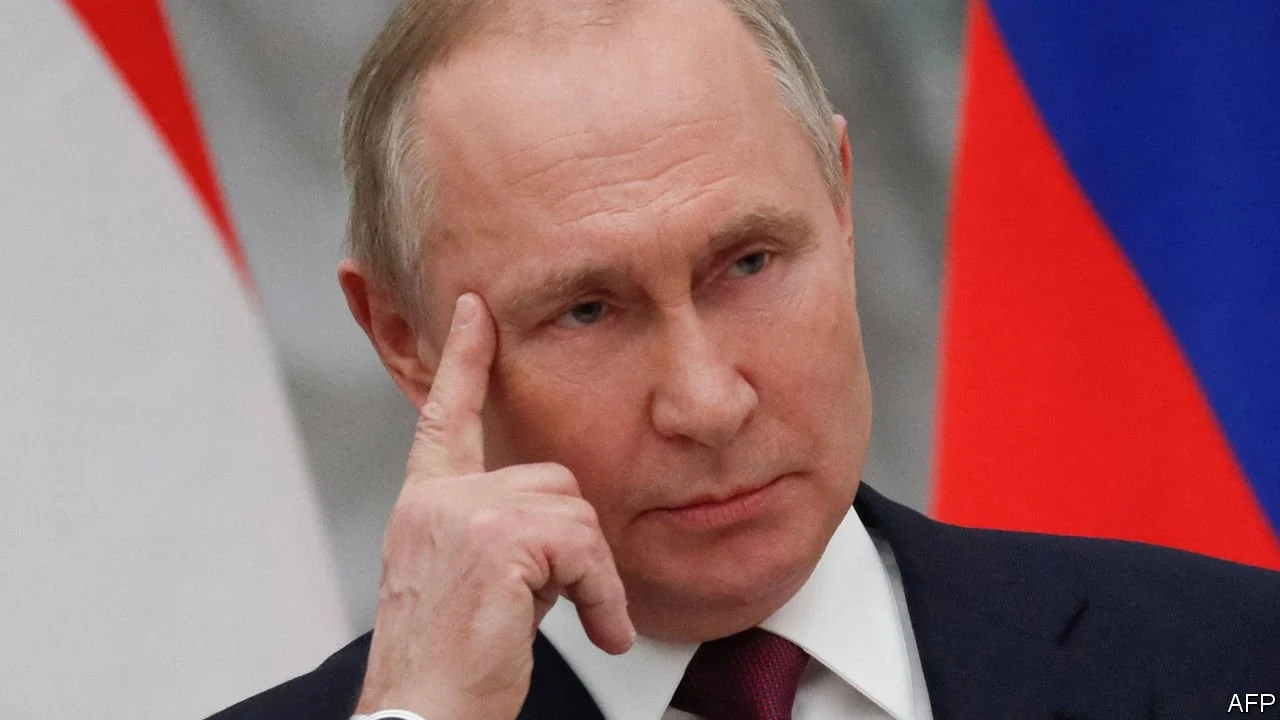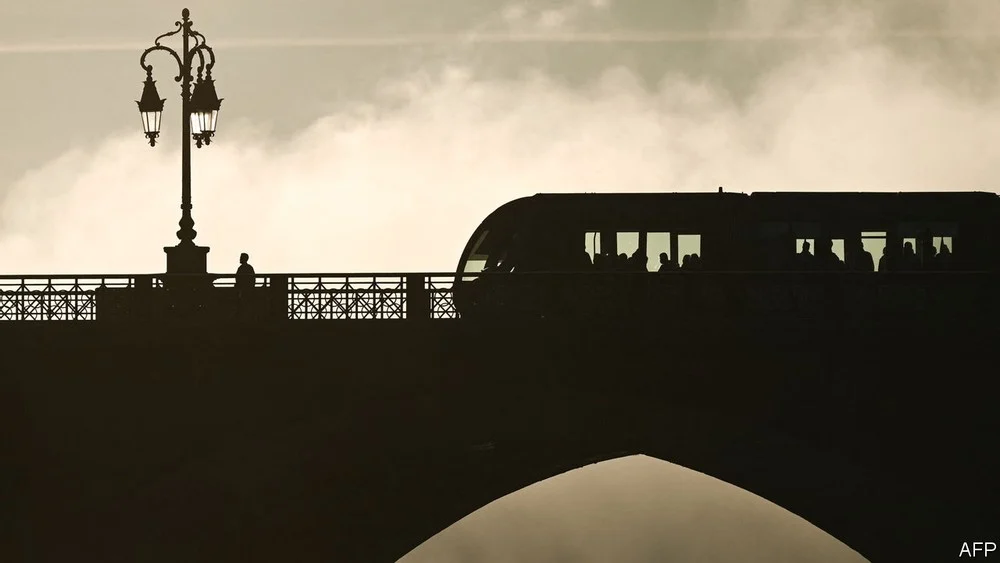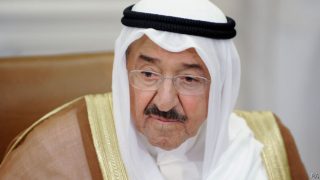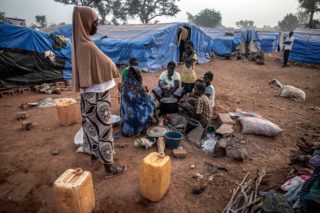
MOSCOW — THE DRAMA started three months ago with American intelligence leaks showing a huge Russian military build-up on Ukraine’s borders. It has been unfolding ever since in a flurry of summits, marathon negotiations and constant background chatter on social media. The moment of crisis is approaching. Whether the end is war or detente, today’s suspense can surely not be sustained for long.
On February 11th Jake Sullivan, President Joe Biden’s national security adviser, told American citizens that they should evacuate Ukraine within 48 hours. A war, he said, is “likely to begin with aerial bombing and missile attacks that could obviously kill civilians”, before adding that Vladimir Putin, Russia’s president, has not made a final decision. Other Western governments have now issued similar warnings to their citizens. KLM, a Dutch airline, halted its flights to Kyiv on February 12th, and other carriers look set to follow suit in the hours to come. As Western citizens leave, journalists are flocking to Ukraine to arrive in time for a war that the Americans are now suggesting could begin as soon as February 16th.
Russia insists that it has no intention of attacking. Sergei Lavrov, the foreign minister, on February 12th accused America and its allies of waging “a propaganda campaign about ‘Russia’s aggression’ against Ukraine”. The Kremlin should be familiar with that concept. It invented the genre, after all, inventing claims about NATO’s threat to Russia and ethnic Russians in Ukraine to justify its annexation of Crimea and move into the Donbas region in south-eastern Ukraine in 2014.
And it is certainly true that America and its allies are now using live intelligence as an information weapon, in the hope of deterring Russia from invading. On February 12th Mr Biden called Mr Putin, to warn him (yet again) of dire consequences should the invasion start. In his summary of the conversation, Yuri Ushakov, Mr Putin’s foreign-policy adviser, said that America’s “hysteria has reached its climax”, but also noted that the talks between the two presidents were business-like.
Despite having marched its troops to the border, Russia now seems to be taken aback by the strength of the information weapon being turned against it.
Over the past week The Economist has spoken to a wide range of diplomats, journalists, officials, economists and businesspeople in Russia. Few of them expected their country to go to war, and none of them wished for it. To a man and woman, they seem petrified by the consequences of such a step, were it to happen.
Geopolitical tension is already hurting the Russian economy, with risk premiums reflected in bonds, stocks and currency markets, says one senior official who asked not to be named. “Russia might be less vulnerable [to external shocks] than it was before 2014, but it is still very integrated in the world economy,” the official said.
Satellite images of Russia’s build-up and diplomatic warnings notwithstanding, life in Moscow and in Kyiv, Ukraine’s capital, is carrying on as normal. In both cities young crowds still roam in search of the latest cool bars. In Red Square children are skating on an illuminated ice-rink to the tune of “Jingle Bells”. At the weekend Volodymyr Zelensky, Ukraine’s actor-turned-president, told journalists arriving in anticipation of a war, that there was “too much information in the information space”. “We understand all the risks,” he said, but if anyone had “additional information regarding a 100%-certain invasion beginning on [February] 16th, please give us this information.”
So what lies behind the latest intensification of the drama? Possibly the apparent dead-end that has been reached in talks over the status of the Donbas region. On February 10th, a day before Mr Sullivan’s statement, Russia and Ukraine had met in Berlin with representatives of France and Germany in what is known as the “Normandy format”. This is the forum for discussing the Minsk agreements, a political document forced on Ukraine in 2014 and updated in 2015, following Russia’s push into the Donbas region.
In the past few years the Kremlin has issued hundreds of thousands of passports to Russian-speakers in two Russian-controlled areas, Donetsk and Luhansk. It has also been trying to oblige Ukraine to give the region a high degree of autonomy, a move that would give itself significant leverage over the whole country. Ukraine understands the dangers well and resisted this move, trying to play for time. Mr Zelensky, nudged by the West, offered to start “consultations” on drafting laws for a political settlement. But Moscow bluntly rejected what it claims is a charade.
In an interview with The Economist after his return from Berlin, Dmitry Kozak, Russia’s chief negotiator and Mr Putin’s deputy chief of staff, said Russia was no longer prepared to play along with what he called a Ukrainian imitation of a peace process. After nine hours of talks between Russia, Ukraine, France and Germany, Mr Kozak said it was blatantly clear, and that written evidence has emerged, that “seven years’ worth of assurances from Ukraine and its allies, about sticking to Minsk [accords] were a bluff”. “The current Ukrainian team is not interested in a resolution to the Donbas conflict. It does not need Donbas for economic and political reasons which they are not even hiding,” he added. A simmering conflict, he argued, helps the Ukrainian government avoid responsibility for the lack of promised reforms at home and allows it to elicit aid from Western creditors and sponsors. Besides, he went on, ending the conflict would incur considerable expenses on reconstructing the ruined infrastructure and would upset a fragile balance in Ukraine’s political system, to the disadvantage of the current government.
Ironically, this assessment is not dissimilar to that of many Ukrainians, who feel that the reintegration of Donbas would poison the country from within. “Sometimes a negative result is a result in itself,” Mr Kozak says, adding that “We are not shutting the door, but we are not going to participate in an imitation of the peace process either. We want to resolve the issue, turn the page and move on.” While accusing Kyiv of scheming, Mr Kozak still appears optimistic that a war can be avoided.
An indication of a possible way to defuse the situation without war is the news that Russia’s parliament is shortly expected to vote on a proposal, tabled by a group of loyal deputies, to appeal to Mr Putin to recognise the two self-proclaimed republics of Donetsk and Luhansk. “This is a very serious and crucial question. We’re talking about protecting the lives of our citizens and compatriots,” Vyacheslav Volodin, a powerful speaker of the Duma, said in a statement on February 11th.
If Russia were to formally recognise the two self-proclaimed republics, as independent entities, or even station its troops and military infrastructure there, it would amount to something not far short of annexation, since the “republics” would be full of newly minted Russian citizens, and be unable to stand on their own feet without substantial help from Moscow.
Ukraine and the West would object loudly to the redrawing of international borders by force. But the move would also lower tensions, because the immediate excuse for an Russian invasion was always likely to be a “provocation”, allegedly by Ukraine, in Donetsk or Luhansk. Even as it protested, the government in Kyiv might therefore heave a sigh of relief, and so would the rest of the world. The danger, however, is that Russia may not stop at that.
By The Economist




